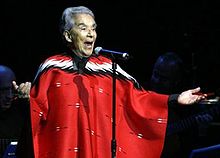- Chavela Vargas
-
Chavela Vargas 
Chavela Vargas in concertBackground information Birth name Isabel Vargas Lizano Born April 17, 1919
San Joaquín de Flores, Costa RicaOrigin Mexico Genres Ranchera Occupations Singer–songwriter, actress Years active 1961–present Associated acts José Alfredo Jiménez Website www.chavelavargas.com.mx Isabel Vargas Lizano (born April 17, 1919) is a Costa Rican-born Mexican singer. She is especially known for her rendition of Mexican rancheras genre - a folkloric musical genre widely popular in Mexico - but she is also recognized for her contribution to other popular Latin American song genres. She has been an influential interpreter in the Americas and Europe, muse to figures such as Pedro Almodóvar, hailed for her haunting performances, and called "la voz áspera de la ternura", the rough voice of tenderness.[1]
Contents
Early life
Isabel Vargas Lizano was born in San Joaquín de Flores, Costa Rica. She goes by Chavela, which is a nickname for Isabel. At only 14,[2] she fled her native country due to lack of musical career opportunities, seeking refuge in Mexico, where an entertainment industry was burgeoning. For many years she sang on the streets but in her thirties she became a professional singer. In her youth, she dressed as a man, smoked cigars, drank heavily, carried a gun and was known for her characteristic red jorongo, which she still dons in performances.
Her first album, Noche de Bohemia (Bohemian Night), was released in 1961 with the professional support of José Alfredo Jiménez, one of the foremost singer/songwriters of the Mexican cancion ranchera.[3] Vargas has recorded over eighty albums thereafter.[4] She was hugely successful during the 1950s, 1960s and the first half of the 70s, touring in Mexico, the United States, France and Spain[5] and was close to many prominent artists and intellectuals of the time, including Juan Rulfo, Agustín Lara, Frida Kahlo, Diego Rivera, Dolores Olmedo and José Alfredo Jiménez.[1] She partly retired in the late 1970s due to a 15 year-long battle with alcoholism, which she has described in her autobiography (Y si quieres saber de mi pasado [And if you want to know about my past], published in 2002) as "my 15 years in hell"[6] At 81 years old, she publicly declared that she was a lesbian.[7][8]
Return to the stage
Vargas returned to the stage in 1991, performing at the venue "El Habito" in Coyoacan, Mexico City,.[1] She debuted at Carnegie Hall in 2003 at the age of 83[9] at the behest and promotion of Spanish director Pedro Almodóvar, a long-time admirer and personal friend of Vargas.
Appearances in film
She is featured in many Almodóvar's films, including La Flor de mi Secreto in both song and video. She has said, however, that acting is not her ambition, although she had previously participated in films such as 1967s La Soldadera.[1] Vargas recently appeared in the 2002 Julie Taymor film Frida, singing "La Llorona" (The Cryer).[10] Her classic "Paloma Negra" (Black Dove) was also included in the soundtrack of the film. Vargas herself, as a young woman, was alleged to have had an affair with Frida Kahlo, during Kahlo's marriage to muralist Diego Rivera.[10] She also appeared in Alejandro González Iñárritu's Babel, singing "Tú me acostumbraste" (You Got Me Used To),[11] a bolero of Frank Dominguez.
Joaquín Sabina's song "Por el Boulevar de los Sueños Rotos" ("Through the Boulevard of Broken Dreams") is dedicated to Vargas.[1]
Selected discography
- Piensa en mí, 1991
- Boleros, 1991
- Sentimiento de México (vol. 1), 1995
- De México y del mundo, 1995
- Le canta a México, 1995
- Volver, volver, 1996
- Dos, 1996
- Grandes Mementos, 1996
- Macorina, 1996
- Colección de Oro, 1999
- Con la rondalla del amor de Saltillo, 2000
- Para perder la cabeza, 2000
- Las 15 grandes de Chavela Vargas, 2000
- Grandes éxitos, 2002
- Para toda la vida, 2002
- Discografía básica, 2002
- Antología, 2004
- Somos, 2004
- En Carnegie Hall, 2004
- La Llorona, 2004
- Cupaima, 2006
- Soledad, 2007
- Piensa en mí, on Splendor in the Grass by Pink Martini, 2009
- Luz de Luna, on San Patricio by The Chieftains featuring Ry Cooder, 2010
- Por mi Culpa!, 2010
See also
References
- ^ a b c d e Boccanera, Jorge, Entrelineas: Dialogos con Jorge Boccanera, ed. Mario José Grabivker (Buenos Aires: Ediciones instituto mobilizador fondos cooperativos C.L., 1999)
- ^ Vargas, Chavela, Y si quieres saber de mi pasado, ed. J.C. Vales, 2nd ed (Madrid: Santillana Ediciones Generales, 2002). In the interview with Jorge Boccanera, Vargas is quoted as saying she arrived in Mexico at 17.
- ^ Diccionario de la Musica Española e Hispanoamericana. 5 vols. Madrid: Sociedad General de Autores y Editores, 2002. s.v. "Vargas, Chavela".
- ^ Yarbo-Bejarano, Yvonne, "Crossing the Border with Chabela Vargas: A Chicana Femme's Tribute" Chap. 3 in Sex and Sexuality in Latin America (New York: New York University Press, 1997)
- ^ Diccionario de la Musica Espanola e Hispanoamericano. 5 vols. Madrid: Sociedad General de Autores y Editores, 2002.
- ^ Vargas, Chavela, Y si quieres saber de mi pasado, ed. J.C. Vales, 2nd ed (Madrid: Santillana Ediciones Generales, 2002)p. 189
- ^ The GULLY | México | Chavela sale del armario
- ^ Lo, Malinda. "The Life and Music of Mexican Legend Chavela Vargas." afterellen.org January 25, 2005
- ^ Vargas, Chavela. (2006) Chavela at Carnegie Hall, CD recording, Tommy Boy
- ^ a b Vargas, Chavela, Y si quieres saber de mi pasado, ed. J.C. Vales, 2nd ed (Madrid: Santillana Ediciones Generales, 2002)
- ^ Tu Me Acostumbraste - Chavela Vargas on Odeo
External links
Categories:- 1919 births
- Living people
- Lesbian musicians
- LGBT people from Mexico
- Mexican female singers
- Mexican musicians
- Mexican people of Costa Rican descent
- People from Heredia Province
Wikimedia Foundation. 2010.

